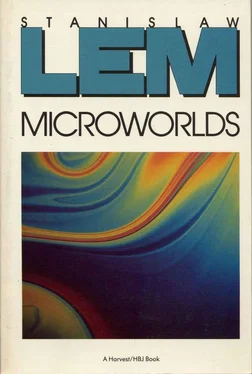A Perfect Vacuum
— it contains fifteen fictitious book reviews — nearly without a pause, and after that my reservoir was empty. Indeed, the comparison can be dragged in a little further. Just as, if you push the button of a toilet too soon, there will flush down only inadequate Niagaras, I can squeeze a little more from my head after the writing of a book like
A Perfect Vacuum.
But I will not be satisfied with the stuff gained this way, and I cast these remnants aside.
My working methods are additionally complicated and enriched by my having from time to time written quasi-scientific works that were not intended as scaffoldlike supports for fiction but meant seriously as independent books on the theory of literature (but they are along empirical lines that are alien to specialists in the humanities). And I have produced Science Fiction and Futurology (1970), which is an acerbic criticism and theory of science fiction; and skeptical futurology, like Summa Technologiae (1964), which doesn’t amass many speculations about the wonderful or terrible things of the near future but, rather, attempts to pursue a few radical ideas to their utmost limits; and the Dialogues (1957), about the horizons and chances of cybernetics implicit in the system; and essays on various topics, such as Biology and Values (1968) and Applied Cybernetics: An Example from the Field of Sociology [2] I shall add the autobiographical element in my discursive writings to this enumeration. In brief, I am a disenchanted reformer of the world. My first novels concerned naïve Utopias, because in them I was expressing a desire for a world as peaceful as that described in them, and they are bad, in the sense in which a vain and erroneous expectation is stupid. My monograph on science fiction and futurology is an expression of my disappointment with a fiction and a nonfiction that pretend to be scientific, when neither of them turns the attention of the reader in the direction in which the world is in fact moving. My Philosophy of Chance is a failed attempt to arrive at a theory of the literary work based on empiricism; it is successful inasmuch as I taught myself with the help of this book what factors cause the rise and the decline in the fortunes of literary works. My Summa Technologiae, on the other hand, is proof of the fact that I am not yet a despairing reformer of the world. For I do not believe that mankind is for all times a hopeless and incurable case.
(1971) — a discussion of the pathology of socialism.
Later, it turned out that several of the ideas that occurred to me during the writing of these works and that I used as hypotheses and examples — i.e., much of what I encountered on my chosen intellectual way during the process of writing — could also be put to good use in fiction. At first, this happened in a totally unconscious manner. I noticed it only when it was pointed out to me; that is, my critics discovered the similarities and were of the opinion that I oscillated with full consciousness between serious discussion and fantastic literature, when I myself was not aware of such a seesawing. Once my attention was drawn to this phenomenon, I sometimes browsed in my own books with an eye toward this possibility of exploitation or cross-fertilization.
In looking back, I see clearly that in my middle period as a writer I wrote fiction without any regard for the existence of some continuity between the imagined worlds and our world. In the worlds of Solaris, Eden, and Return from the Stars, there are no immediately obvious transitional stages that could connect these states of civilization with the obnoxious state of things on earth today. My later work, on the other hand, shows marked signs of a turning toward our world; that is, my later fictions are attempts to establish such connections. I sometimes call this my inclination toward realism in science fiction. Most likely, such attempts, which to some extent have the unmistakable character of a retreat (as a renunciation of both Utopia and dystopia, extremes that are either repugnant to me or leave me cold, just as is the case for a physician when he faces someone incurably ill), spring from the awareness that I must soon die, and from the resulting desire to satisfy, at least with hypotheses, my insatiable inquisitiveness about the far future of mankind and the cosmos. But that is only a guess; I wouldn’t be able to prove it.
In response to a request to write his autobiography, Einstein emphasized not the historical circumstances of his life but, rather, his most beloved offspring — his theories -because they were the children of his mind. I am no Einstein, but in this respect I nevertheless resemble him, for I am of the opinion that the most important parts of my biography are my intellectual struggles. The rest, not mentioned so far, is of a purely anecdotal character.
In 1953, I married a young student of medicine. We have a son of fifteen, who likes my novels well enough but modern music — pop, rock and roll, the Beatles — his motorcycle, and the engines of automobiles perhaps even more. For many years now, I have not owned my books and my work; rather, I have become owned by them. I usually get up a short time before five in the morning and sit down to write: I am writing these words at six o’clock. I am unable now to work more than five or six hours a day without a pause. When I was younger, I could write as long as my stamina held out; the power of my intellect gave way only after my physical prowess had been exhausted. I write increasingly slowly — my self-criticism, the demands I put upon myself, have continued to grow — but I am still rather prolific. (I know this from the speed with which I have to throw away used-up typewriter ribbons.) Less and less of what comes into my mind I consider to be good enough to test as suitable subject matter by my method of trial and error. I still know as little about how and where my ideas are born as most writers do. I am also not of the opinion that I am one of the best exegetes of my own books — i.e., of the problems characteristic of them. I have written many books of which I haven’t said a word here, among them The Cyberiad, the Fables for Robots (in Mortal Engines), and The Star Diaries, which on the generic map of literature are to be found in the provinces of the humorous — of satire, irony, and wit — with a touch of Swift and of dry, mischievous Voltairean misanthropy. As is well known, the great humorists were people who had been driven to despair and anger by the conduct of mankind. In this respect, I am one of those people.
I am probably both dissatisfied with everything that I have written and proud of it: I must be touched by arrogance, but I do not feel anything of it. I can notice it only in my behavior — in the way that I used to destroy all my manuscripts, in spite of many attempts and requests to get me to deposit these voluminous papers in a university or some other repository to preserve them for posterity. I have made up a striking explanation for this behavior. The pyramids were one of the wonders of the world only while there was no explanation of how they were erected. Very long, inclined planes, on which bands of workers hauled up the stone blocks, possibly on wooden cylinders, were leveled once the work was finished, and thus today the pyramids rise up in a lonely way among the shallow sand dunes of the desert. I try to level my inclined plane, my scaffolds and other means of construction, and to let stand only that of which I need not be ashamed.
I am not sure whether what I have confessed here is the pure truth, but I have tried to adhere to truth as well as I could.
Translated from the German by Franz Rottensteiner
Читать дальше












